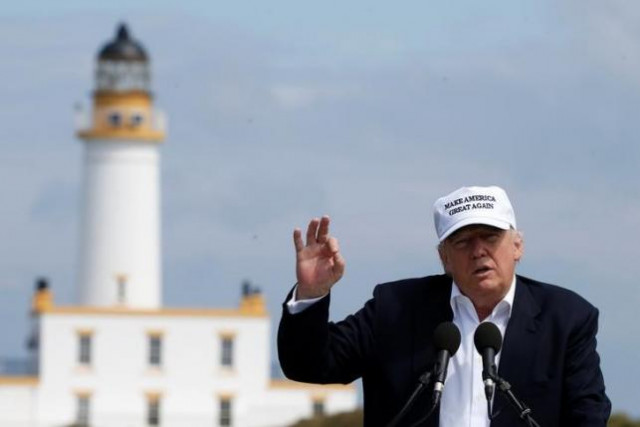What the Brexit vote tells us about whether Trump can win
Britain’s bigger cities are far more racially and ethnically diverse than its small towns and rural communities

Donald Trump speaks during a news conference at his new golf hotel property in Turnberry, Scotland, June 24, 2016. PHOTO: REUTERS
In one all-important particular, the United States is not Britain: Minority voters now constitute nearly a third of the electorate in America, while they’re no more than one-tenth of the British voting public.
Nonetheless, the similarities between Britain’s political moment and ours – and, for that matter, the fraught politics of most Western democracies – can’t easily be dismissed.
Let’s begin with the geography of the British vote, which should look all too familiar to students of American politics.
Brexit will put pressure on global growth: IMF deputy MD
Everywhere throughout Britain, the vote to stay in the European Union was strongest in cities – London, Edinburgh, Belfast, Cardiff, Glasgow – and even such cities in the otherwise pro-Brexit working-class post-industrial belt as Manchester and Liverpool.
Britain’s bigger cities are far more racially and ethnically diverse than its small towns and rural communities. It’s to the cities that millennials flock.
In the United States, similarly, cities are far more diverse and politically progressive. Of the 30 largest US cities, 28 now have Democratic mayors, the greatest partisan imbalance since the advent of American political parties.
Conversely, the pushback against immigrants in both nations is often strongest in insular rural areas that have actually experienced little immigration. The worldview in these regions is generally premised on preserving their homogeneity.
London must move fast to take more power after Brexit, Mayor Khan says
Let’s move on to the age gap. The one British exit poll found that 73 per cent of voters under age 25 voted to stay in the European Union, and that percentage declined in each successively older age cohort. Only 40 per cent of voters above age 64, by contrast, voted to stay.
The age gap in the Brexit referendum is virtually identical to the age gap in the Bernie Sanders and Hillary Clinton primary contest. Roughly 71 per cent of voters under age 30 cast their ballots for Sanders, a level of support that also then declined in each successively older cohort; 72 per cent of voters 65 and older backed Clinton.
All these numbers point not to one trans-Atlantic populist revolt, but several. There’s the revolt of older white voters, who see their economic prospects dimmed by globalization, which has subjected them to low-wage competition and over which they’ve had no control.
Many fear and rage at immigrants and racial and religious minorities; they sense they’ve lost their place as the protagonists of their nation’s story -- their national epic. This sense of economic, political and social displacement, often compounded by xenophobia and racism, has fuelled the rise of Trumpism in the United States, as well as the nativist UK Independent Party in Britain.
Australia PM says re-elect us to counter Brexit chaos
But it’s fuelled far more than that: Years before anyone but Trump himself contemplated a Trump candidacy, much less a Trump nomination, Republicans had already morphed into a nationwide Dixiecrat Party. They campaigned against immigrants and minorities, and erected restrictions to voting that were intended to diminish minority participation.
Four years ago, writing not about Trump’s campaign but Mitt Romney’s, I concluded the GOP’s credo could be reduced to: “We’re old, we’re white and we want our country back.” Today, that’s the credo of much of the populist right on both sides of the Atlantic.
But the politics of millennials – metropolitan millennials in particular – are quite different, even when their own discontents are also labelled populist by establishment commentators.
The Bernie Brigades in the United States and the young supporters of such far-left European parties as Podemos in Spain or Syriza in Greece are even more scathing than the right-wing populists in their assessments of financial elites and the governments in their sway.
Unlike the UKIPs and the Trumpians, however, the left champions a range of policies – fiscal stimulus, worker rights, progressive taxation – that could actually address their nation’s plights. (Though Syzira, once it came to power in Greece, was blocked from implementing its program by creditor nations and banks.)
US voices Brexit regret as Kerry heads to London
Moreover, these parties and tendencies – disproportionately of the young – are not merely racially and ethnically tolerant but racially and ethnically diverse. That’s why the appeals to nativism never stood a chance among Britain’s younger voters.
That’s also why the most effective Democratic message to (largely white) young Sanders stalwarts, who can’t yet see themselves voting for Clinton, would be to have young immigrants, Latinos, blacks and Asians tell them just how a Trump presidency would impact -- and in many cases ruin -- their lives.
The far-right populism and talk of bigoted xenophobia from many non-big-city whites, who have been left behind by globalized capitalism, by the economic policies of Western governments and by the growing cosmopolitanism of urbanites and the young, has become a force in almost every Western democracy. It fuels Trump’s candidacy. Yet it probably lacks sufficient adherents to put him in the White House.
Nonetheless, the crash of 2008 and its rocky aftermath, like that of 1929 and its aftermath, has shaken the politics of the West. Brexit almost surely won’t be the last such shock.



















COMMENTS
Comments are moderated and generally will be posted if they are on-topic and not abusive.
For more information, please see our Comments FAQ